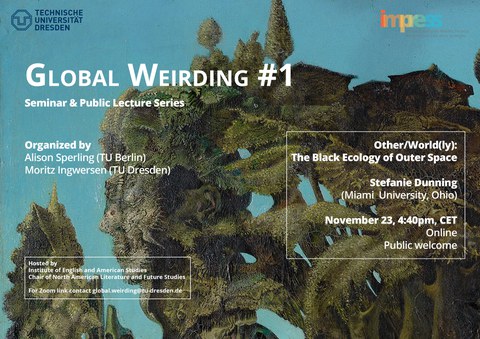Nov 14, 2021
Global Weirding Guest Lecture #1 - Stefanie Dunning (Miami University, Ohio)
"Other/World(ly): The Black Ecology of (Outer) Space."
Stefanie Dunning (Miami University, Ohio)
November 23, 4:40pm CET, Zoom
Global Weirding Lectures #1
Abstract
I am the brother of the wind
I cover the Earth and hold it like a ball in my hands
I can take away others to another galaxy
I will take you to new worlds
I will take you to outer unseen worlds that are more beautiful than anything the earth presents.
--Sun Ra, Tweet, June 29, 2021
On his Lanquidity (1978) album, the musician and artist Sun Ra features a piece called “There Are Other Worlds (They Have Not Told You About).” In the expansive, curious provocation of sonic mystery embodied by both the sound of the piece and its title, we are invited to consider that what we imagined to be a totality (the known world) is in fact merely a fragment of an other/world(ly) context we have yet to grasp, pointing towards a broader (celestial) ecological field. This talk examines (outer) space to illuminate the way that mainstream representations of space cohere with colonialist narratives vis-a-vis blackness and how black writers and artists approach the blackness of (outer) space in a way that heals the conceptual rift introduced by Rene Descartes and Francis Bacon (and other enlightenment thinkers) when they defined "man" as the opposite of nature. This rift, I argue, sets the stage for the anti-blackness of Western society. Therefore, we can read contestations of Western arrangements relative to nature as a simultaneous rejection of anti-blackness.
In this talk, I utilize critical work by J.T. Roane, Sylvia Wynter, and Sharon Holland to stage a textual analysis of Afrofuturist texts like Sun Ra's Space Is the Place (1974). I intend to show that the way outer space is understood as antipodal to natural space, though it is, of course, as natural as any forest, exposes the continuing herniation in Western society between nature and the enlightenment human. Thus, traditional (outer) space narratives operate as recapitulations of colonialist and “new world” schemas that reproduce antiblackness and its antecedent rupture from the natural world. Yet black artists and writers subvert colonialist space narratives by defining (outer) space as the site of a felicitous non-Western elsewhere, stylizing other/world(li)ness in ways that disclose the capaciousness of black/space, where the universal precondition for embodied being is blackness, without which nothing is visible.
Stefanie K. Dunning is an Associate Professor of English at Miami University. She is a graduate of Spelman College and the University of California, Riverside, and a Ford Fellow. Her first book, Queer in Black and White: Interraciality, Same-Sex Desire, and Contemporary African American Culture, from Indiana University Press, was published in 2009. Her latest project, Black to Nature: Pastoral Return and African American Culture from the University Press of Mississippi was published in April 2021. In addition to her published books, she has been published in African American Review, MELUS, Studies in the Fantastic, and other journals and anthologies. She also has a podcast, called Black to Nature: the podcast, available for listening on all major platforms.

